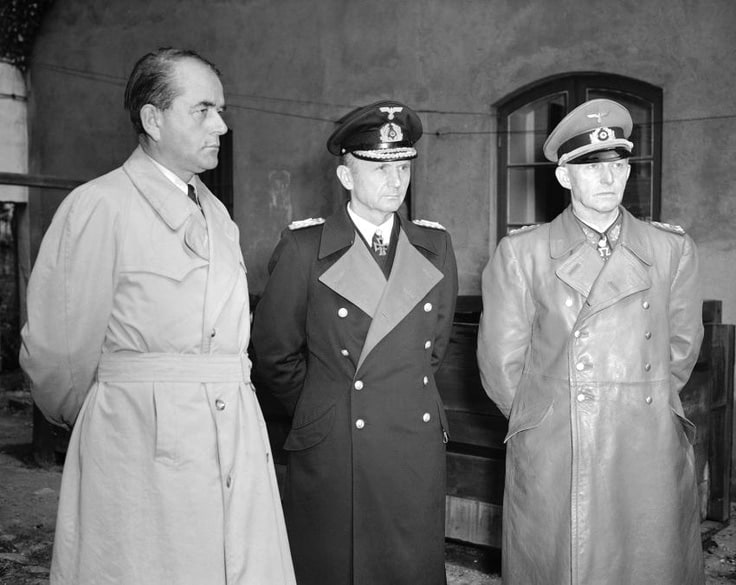
Hitler’s Will and the Flensburg Government
By the end of April 1945, the war was drawing to its close. Hitler, hidden in the Fuhrer bunker beneath the Reich Chancellery gardens of Berlin was aware his end was nigh and plotting his suicide. But he had to make sure the Reich did not pass to either Goring of Himmler. Both were now completely out of favor with Hitler. Goring had enraged him by asking for permission to assume leadership of the Reich. Worse yet, Himmler had tried to seize power and attempted to surrender to the Allies on May 28. The allies refused him.
So Hitler had to fix upon another successor. On April 29, 1945- the day before his suicide, he re-wrote his will, naming not one but two men to succeed him. This was a reversion to the custom of the Weimar government Hitler had overturned. Goebbels was to be Chancellor and head of government. But Karl Donitz was to be Supreme Commander of the armed forces and President of the Reich. But when Hitler committed suicide the next day, Goebbels copied him- leaving Donitz to take over the whole leadership as the last Fuhrer of the Third Reich.
Donitz and his new government established itself at Flensburg -Murwik near the Danish border- hence the name “The Flensburg Government”. When Donitz learned of his unexpected legacy, he assumed Hitler wanted him to negotiate the end of the war. ” The picture of the military situation as a whole showed clearly that the war was lost, ” he said later “. As there was also no possibility of effecting any improvement in Germany’s overall position by political means, the only conclusion to which I, as head of state, could come was that the war must be brought to an end as quickly as possible in order to prevent further bloodshed.”
But Donitz wanted to surrender to the British and Americans-not the Russians. “My first task is to save German men and women from destruction by the advancing Bolshevist enemy,” he stated in his first radio broadcast as the leader on the May 1, 1945. By May 4, all forces in western Europe had been surrendered to the British Field Marshall Sir Bernard Law Montgomery. Donitz ordered that the signing of the declaration of surrender was delayed as long as possible to allow eastern German troops to more west and surrender to the British and Americans. In this way, Donitz saved 1.8 million German soldiers from Soviet revenge.

